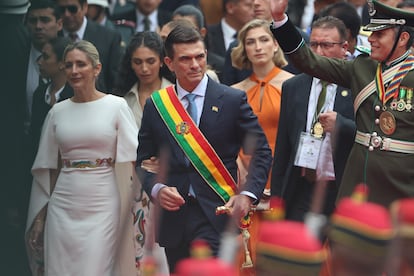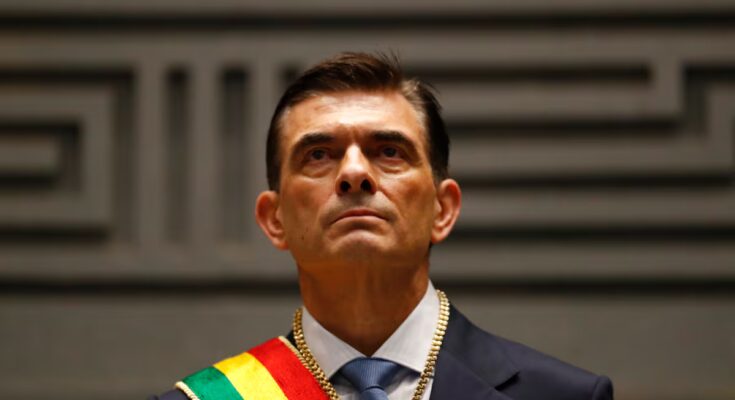This Saturday’s oath Rodrigo Paz as Bolivia’s 68th president ushers in a new era in the country, closing 20 years of Movement Towards Socialism (MAS) rule. “This is the new Bolivia, which opens up to the world. Never again an isolated Bolivia, subject to failed ideologies”, he promised in his first official speech, in which he announced judicial, economic and even “moral” reforms. The change is not just economicbut also social and cultural: the typical clothing of the native populations that predominated in the Assembly has diminished in favor of suits and ties. The official image of the State, which previously recovered ancient symbols of the region such as the Andean cross, has returned to being the traditional republican coat of arms.
Paz dedicated a good part of his message to retracing what he reported as errors of previous administrations, for which he blamed the deep economic crisis and recession that the country is going through. “Every present and future is better than the past. We will overcome this past of misfortune that was generated for Bolivians. We received a devastated country, bankrupt, without international reserves (…) Evo (Morales), (Luis) Arce, where are the gas and lithium?”
The new head of state was awarded the presidential sash and medal by his vice president shortly before, Edmand Larawho wore a police uniform in honor of his origins as a gendarme. “God, country and family!” he said before taking the oath.
If Evo Morales acted in an unprecedented way his investiture in 2006 at the ceremonial archaeological site of Tiahuanacothe new president received, after the act in Parliament and after many years, the batons of command in the Metropolitan Cathedral, in La Paz, as well as the blessing of the ecclesiastical authority. Not all the symbolism of the previous administration has been discarded: after receiving recognition from the police and the army, Paz accepted two truncheons from the native communities, which have been awarded to her by constitutional mandate since 2009.
The peasant and social movements, who held positions in the executive branchthey were present in the speeches of the new Government. It was, in reality, a response to the symptoms of annoyance expressed by these sectors in the face of rumors about the formation of the next ministerial cabinet, which will be announced this Sunday. “The ministers must show the face of the people. If they showed a pure tie, a purely American name, it would no longer be our government”, stated days ago the militant of the governing Christian Democratic Party (PDC), Edgar Morales. who helped get the vote out in Andean indigenous enclavesalready bastions of the MAS.
Vice President Lara responded in her speech: “It is a lie that we discriminate against social organizations, we owe them a lot.” Whoever will also hold the position of president of the Assembly draws popular support and support from peripheral areas, which he did not fail to mention in his statement: “My respect for humble people, who work every day, for self-employed workers, housewives, people with disabilities. No one will discriminate or exclude them.” A former police officer fired for reporting acts of corruption within the institution through his TikTok account, Lara referred to indigenous leaders such as Túpac Katari or Zárate Willka.

The Assembly event concluded with the projection of images of tankers entering Bolivia. The supply of petrol and diesel from the first day of his mandate was one of the promises of the new president. Hydrocarbons represent the main source of foreign currency for the country; the lack of production, due to the lack of investment in exploration, caused the increase in prices and the absence of dollars, with the consequent creation of a parallel market. “What the hell did they do with so much wealth? Because now there are people who don’t have enough to eat, if we were as rich as they say. They will answer to the country for treason,” Paz warned.
After the event, the President held the first informal meetings with the invited Presidents. Five arrived: the leaders of Ecuador, Paraguay, Chile, Uruguay and Argentina. It was the president of the latter nation, Javier Milei, who had been most heralded days earlier by the government office. Milei was also the first to congratulate Paz on his victory in the October 19 elections. It is a clear example of the new direction that we are trying to give to Bolivia’s international relations. Late last month, the president made his first official visit to the United States, after more than two decades of broken relations between the two countries.
Likewise, the Christian Democratic leader has already announced a loan of 3.5 billion dollars from the Andean Development Cooperation (CAF). At the other extreme, Bolivia was recently expelled from the Bolivarian Alliance for the Peoples of Our America (ALBA), after describing Cuba, Venezuela and Nicaragua, the countries that lead that international organization, as “undemocratic.”



